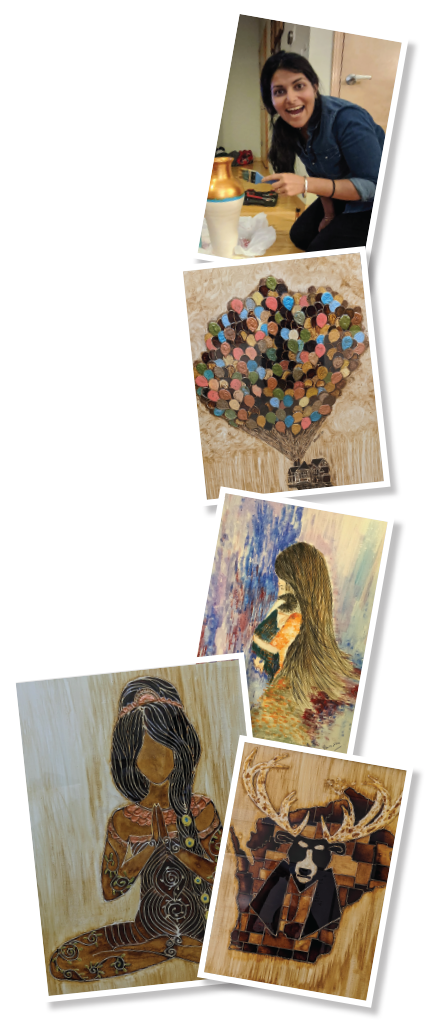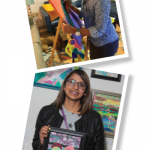Some artists paint with oils or watercolors, others with acrylics. Shivani Garg, MD, MS, prefers Nescafé or Maxwell House coffee.
A faculty member in the Division of Rheumatology in the Department of Medicine at the University of Wisconsin School of Medicine and Public Health (UWSMPH), Madison, Dr. Garg learned this technique—painting with instant coffee mixed with water—at summer art camp while living in India a decade ago.
“I worked with an artist at summer camp who used a lot of metallic paints and coffee,” she says. “With coffee, you can get a different shading effect. You can make it darker or dilute the medium to make it lighter. It gives nice colors and offers a nice gradation.”
Dr. Garg has been painting since she was 15 years old. She learned the art of painting from her mother, an architect, who paints as a hobby.
Since then, Dr. Garg has created 100 paintings. When living in India in 2011, she sold 22 paintings. This past October, 20 of her coffee paintings were on display for one month at UWSMPH. These paintings were also featured on her website along with her poetry.
She says practicing as a physician has helped her become more in tune with human emotions—not only her own but those of her patients—and better able to transfer those feelings onto canvas through various images and colors.
“Painting helps me process those emotions and better understand another person’s perspective,” she says. “It gives me an opportunity to release those emotions and also connect with patients.”
Academics & Accolades

Dr. Garg decorates a pot.
Dr. Garg’s academic and medical career has been filled with accomplishments.
She graduated medical school in 2011 from the Government Medical College & Hospital, Chandigarh, India, receiving eight awards and achieving the highest rank in her class.
During the next three years, she completed her residency at Einstein Medical Center, Philadelphia. In 2017, she finished a rheumatology fellowship at Emory University, Atlanta. Also in 2017, she assumed her current role at UWSMPH, and the following year, earned a Master of Science in clinical investigation and research from UWSMPH.
Her clinical research is focused on better understanding the pathophysiology of lupus, improving outcomes and reducing disparities in lupus. She is developing interventions to improve adherence to pivotal therapies and examining early predictors of poor clinical outcomes, including cardiovascular disease and chronic kidney disease in patients with lupus and lupus nephritis.
In 2018, she set up a lupus clinic in Madison, Wis. That same year, she also established a multidisciplinary lupus nephritis clinic at UW Health, the academic medical center and health system for the University of Wisconsin, to provide comprehensive care to patients with lupus and lupus nephritis.
Over the past two years, she has presented at plenary sessions at ACR Convergence that addressed racial disparities in cardiovascular disease and stroke in patients with lupus.



